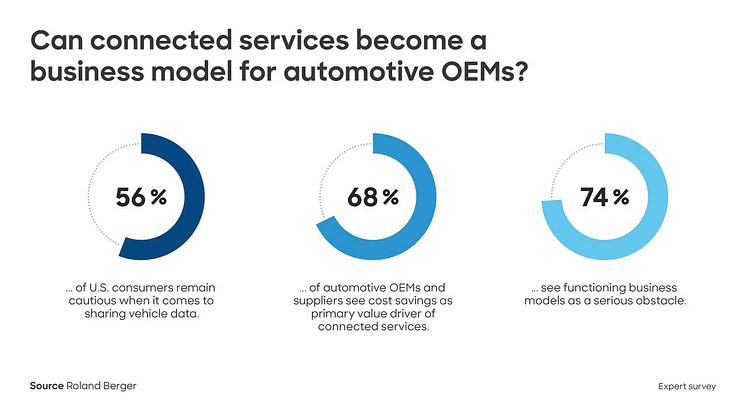
Press release -
New Roland Berger study: After a slow decade, connected services are poised to take off – if remaining industry hurdles are overcome
- 7 out of 9 major adoption hurdles, especially technology challenges, for connected services have been largely overcome since 2015
- Functioning business models and customer acceptance remain a key challenge: Over 50% see it as a serious obstacle
- Automakers have struggled to monetize connected cars with consumers, but fleets see clear value and will pay for tailored services. A shared platform enabling third-party innovation may be the key.
Munich, September 2025:Vehicle connected services – from infotainment apps to self-driving functionality – have been in the slow lane for years. But they may now finally be on the verge of mass adoption. A new research by Roland Berger, the Connected Vehicle Systems Alliance (COVESA) and Geotab suggests the technology is in place, and many former obstacles to widespread acceptance, such as costs and a lack of user-friendliness, have been largely overcome. In addition, carmakers and suppliers now view connected services as a priority, core product and not just an afterthought. The study is based on insights from 27 industry experts including OEMs, suppliers, research institutions, and dealerships.
It found that the number of respondents citing a lack of connected vehicles as a primary blocker to the rollout of connected services in 2015 compared to 2025 falls from 84 percent to 0 percent, while only half of those surveyed perceive customer acceptance and willingness to pay for connected services as a barrier in 2025, compared to almost 100 percent in 2015. The survey also revealed that the main barrier to widespread adoption of connected services remains a lack of functioning business models (74%). Experts recommend strategies to address this, including embedding connected services costs within vehicle prices and developing differentiated models to target the specific requirements of fleet managers and consumers.
“Achieving these aims will require some radical transformations in the industry,” said Konstantin Shirokinsky, Partner at Roland Berger. “Our study outlines a potential new operating model based around three major shifts away from current practice: decoupling monetization from value creation; developing cross-functional teams that span automotive and software engineering; and industry-wide collaboration to drive system interoperability.” The key message for OEMs and suppliers? Ditch trying to develop the next great feature and instead work together to create a standardized platform that offers users simple and frictionless access to popular digital services.
Different customer groups need targeted approaches
While customer acceptance and willingness to pay for connected services has risen markedly, 54 percent of survey respondents still regard it as a primary obstacle to roll-out today (compared to 96% in 2015). Some believe it’s only a matter of time until customers become hooked on new services, while others believe subscriptions will never take off. Suppliers are more positive than OEMs about their chances. “Interestingly, suppliers are bigger believers in connected services as revenue drivers. Fifty percent of suppliers told us they believe connected services will drive more than 10 percent of OEM revenue in 10 years, while only 33 percent of OEMs share the same level of optimism,” said Shirokinsky.
Most experts believe producers should target fleet managers and consumers differently, for example, offering fleet managers services that enhance safety and optimize costs, and consumers more choice of apps. Consumer services are likely to have more appeal if they create value rather than generate revenue as willingness to pay remains rather low. Overall, customers mostly want a few connected services that are useful and work well, such as being able to tune into their favorite streaming services while they are on the road.
Operating model adoption is key
For automotive OEMs and suppliers to achieve a successful roll out of connected services, the challenge will be to adopt a new operating model that fuses new value creation models with software product development processes and traditional automotive engineering. This can be achieved using the three-pronged approach. “Ultimately, there is every reason to believe that an industry with over a century of experience in knowing the consumer and their deepest aspirational values, will find a personal connection that endures long after the customer has driven the car home,” said Shirokinsky.
Topics
Categories
About Roland Berger
Roland Berger is one of the world's leading strategy consultancies with a wide-ranging service portfolio for all relevant industries and business functions. Founded in 1967, Roland Berger is headquartered in Munich. Renowned for its expertise in transformation, innovation across all industries and performance improvement, the consultancy has set itself the goal of embedding sustainability in all its projects. Roland Berger generated revenues of around 1 billion euros in 2024.
About COVESA
The Connected Vehicle Systems Alliance is an open, collaborative, and impactful global community accelerating the full potential of connected vehicles. COVESA is a not-for-profit organization, and the only alliance focused solely on developing common approaches and technologies for connected vehicles. We are well-aligned to address opportunities and challenges in the automotive industry, which is experiencing a digital transformation driven by fundamental customer expectations.
About Geotab
Geotab is a global leader in connected vehicle and asset solutions, empowering fleet efficiency and management. We leverage advanced data analytics and AI to transform fleet performance, safety, and sustainability, reducing cost and driving efficiency. Backed by top data scientists and engineers, we serve over 55,000 global customers, processing 80 billion data points daily from more than 4.9 million vehicle subscriptions. Geotab is trusted by Fortune 500 organizations, mid-sized fleets, and the largest public sector fleets in the world, including the US Federal Government. Committed to data security and privacy, we hold FIPS 140-3 and FedRAMP authorizations. Our open platform, ecosystem of outstanding partners, and Marketplace deliver hundreds of fleet-ready third-party solutions. This year, we're celebrating 25 years of innovation. Learn more at www.geotab.com and follow us on LinkedIn or visit Geotab News and Views.



